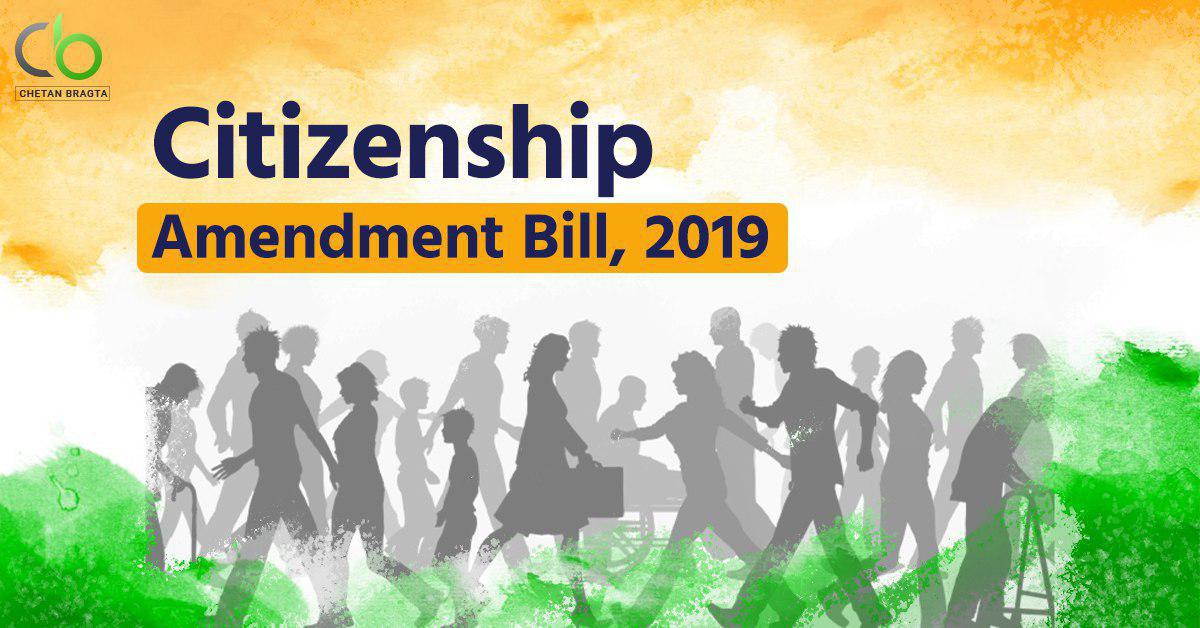
The historic Citizenship Amendment Bill, 2019 has been passed by both the houses of the Parliament. My heartiest congratulations to Narendra Modi Ji and Amit Bhai Shah ji. It was extremely necessary to bring this bill to fruition. In this post, I will highlight the features of the Bill and why it was important to take this step:
What does the Bill propose to do?
The Citizenship Act, 1955 regulates the matters of Indian citizenship and lays down who is eligible to gain citizenship. As per the Act, you can become an Indian citizen in the following ways: by birth in India, by descent, through registration, by extended residence in India, and by incorporation of any territory into India.
People who enter India without valid documents or stay beyond the permitted time period specified in the visa are called illegal migrants under the Citizenship Act. These migrants can be deported or imprisoned by the government under the provisions of the Foreigners Act, 1946 and the Passport (Entry into India) Act, 1920.
As per the 2019 Bill, the definition of illegal migrants will be amended to exclude Hindu, Sikh, Parsi, Buddhist and Christian immigrants from Pakistan, Afghanistan and Bangladesh, who have lived in India without documentation. Such persons will be eligible for a fast-track Indian citizenship in five years, as opposed to 11 years of residence which is a criterion to gain citizenship for those who are not Indian citizens by birth or parentage. It is also important to note that the provisions of the Bill do not apply to specified regions of the North East.
The Bill also makes amendments in relation to the Overseas Citizens of India cardholders. As per the current citizenship laws, a foreigner may register as an OCI if they are of Indian origin (e.g., former citizen of India or their descendants) or the spouse of a person of Indian origin. The Bill amends the position to allow the government to cancel the OCI registration if the person has violated any law notified by the central government.
Why is this Bill necessary?
The Statements of Object and Reasons of the Bill rightly states that millions of citizens of undivided India belonging to various faiths were staying in the said areas of Pakistan and Bangladesh when India was partitioned in 1947. Pakistan, Afghanistan and Bangladesh are theocracies and prescribe a state religion. As Islam is the state religion of these countries, persons belonging to Hindu, Sikh, Buddhist, Jain, Parsi, and Christian communities face religious persecution in those countries. There is also evidence that such persecution affects the day-to-day life of such people and prevents them to practice, profess and propagate their religion. Some of them have fled to India to protect them from religious persecution and have stayed in India beyond the permitted time, or in some cases, with incomplete or no documents.
In the past, the Central Government exempted such migrant from the adverse penal consequences of the Passport (Entry into India) Act, 1920 and the Foreigners Act, 1946. Subsequently, the migrants were also made eligible for long term visa to stay in India. The 2019 Bill proposes to make the migrants eligible for Indian citizenship on a fast track basis. In order to be eligible for the benefits under this Bill, the migrants should have entered India on or before December 31, 2014.
Why the opposition’s fears are baseless?
There is a lot of fake propaganda that has resulted in a state of fear psychosis in the minds of current citizens of India, especially those who belong to the Muslim community. The truth of the matter is that there is no reason to feel that that Bill is against the Muslim community. The Bill is only to help those communities who are facing religious persecution in Islamic countries and have been stripped of their dignity. I would like to reiterate what Amit Bhai ji Shah said in the Parliament: “For the Muslims of this country, there is no question of debate or concern. They are citizens of India,will remain citizens and no one will harass them.” The Bill does not prevent anyone from acquiring Indian citizenship. It is still possible for any other migrant (who does not fulfil the criteria under the Bill) to become an Indian citizen under the specified provisions of the Citizenship Act.
I truly feel that the Bill is in line with India’s centuries old tradition of assimilation. For those who are arguing that the Bill violates Article 14 of the Constitution of India, it is important to remember that even the Constitution allows reasonable classification to help underprivileged people. Over the years, media has reported the atrocities faced by women like Lata and Asha who were persecuted in Pakistan on the grounds of religion. Through this Bill, Modi ji’s government has upheld its responsibility of caring for its people and protect the minorities. Once again, Modi ji has proved that Modi Hai toh Mumkin Hai.